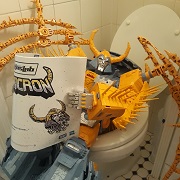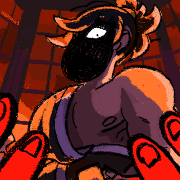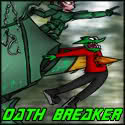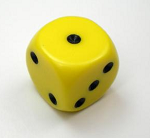|
Agent Rush posted:I picked this up because I was interested in the design aspects/expansion of PBTA. Firebrands is absolutely the stand-out, but I also found Murderous Ghosts and Midsummer Wood to be worthwhile reads. Note that when Spin The Beetle says bugs, they mean actual insects. If two or more of the games sound interesting to you or you want to see how the developers of Apocalypse World play with their engine, I'd say grab the bundle. Otherwise just get Firebrands and you won't be missing too much. To add on, Firebrands is written in the same rules style as The King is Dead, which is also worth checking out.
|
|
|
|

|
| # ? May 13, 2024 21:36 |
|
QuantumNinja posted:To add on, Firebrands is written in the same rules style as The King is Dead, which is also worth checking out. Agent Rush posted:I picked this up because I was interested in the design aspects/expansion of PBTA. Firebrands is absolutely the stand-out, but I also found Murderous Ghosts and Midsummer Wood to be worthwhile reads. Note that when Spin The Beetle says bugs, they mean actual insects. If two or more of the games sound interesting to you or you want to see how the developers of Apocalypse World play with their engine, I'd say grab the bundle. Otherwise just get Firebrands and you won't be missing too much. I'll check it out then, thank you!
|
|
|
|
malkav11 posted:RPPR has done some PBTA episodes, and the second season of The Adventure Zone was Monster of the Week. I don't know that either pod entirely groks PBTA but it's more grist for the mill. Absolutely do not listen to The Adventure Zone as an example of how to run a PBTA game. The most helpful podcasts that i listened to for GM stuff were the assorted Six Feats Under arcs for shorter games and Friends At The Table for longer campaign stuff.
|
|
|
|
Lumbermouth posted:Absolutely do not listen to The Adventure Zone as an example of how to run a PBTA game. The most helpful podcasts that i listened to for GM stuff were the assorted Six Feats Under arcs for shorter games and Friends At The Table for longer campaign stuff. I agree. I've played a ton of AW and PbtA games, and I thought the Adventure Zone Monster of the Week podcast was fun, but it wasn't a great example of how to run the game. I can't tell how much was about the editing and how much they just played rules-lite, but either way, it doesn't give you a good feel for how to use the system.
|
|
|
Megazver posted:I think Street Horrrsing is saying that the system requires their players to talk more... and the players are struggling with it and SH is struggling trying to squeeze any talking out of them. (A situation I am very familiar with.) Totally empathise with this. PbtA flows easily with proactive players but really expects everybody to "lean forward in their seats" as it were, which is tough when your players are used to the breaks in the action that crunchier systems will inevitably have as you discuss tactics/check rules/calculate scores out of fiction. PbtA's constant "what do you do? what do you do? what do you do?" can be exhausting. For another take on Street Horrrsing's struggle: Had a group of newbies playing Apocalypse World who were quite hands off at first but it clicked for them when one of them asked a question about the local wildlife and I said "I honestly can't think of anything, what do you think?". You could immediately feel them relax a bit and start just chatting about the fiction and things in this kind of fiction that they like, from which you can then add things to the game that they'll want to engage with. It's a nice vibe to have at the table and really helps the game flow more easily when you're taking breaks to just chat about and around the fiction, or just chat in general! Macdoo fucked around with this message at 23:44 on Mar 7, 2021 |
|
|
|
|
Lumbermouth posted:Absolutely do not listen to The Adventure Zone as an example of how to run a PBTA game. The most helpful podcasts that i listened to for GM stuff were the assorted Six Feats Under arcs for shorter games and Friends At The Table for longer campaign stuff. I'll third what Lumbermouth and Zorak said. Six Feats Under and Friends at the Table are both fantastic reference points for how to run PBTA style games. You should listen to them!
|
|
|
|
Those are great resources guys, thanks for all the help. Hopefully next week's game will run smoother.
|
|
|
|
77, more than most other games, has an aura of letting the players misbehave and do drugs without much consequence. (in fact, one of the basic moves requires chemical assistance!) Itís the genre, and itís what people want out of the 70s. hereís a brief bit from a longer episode where I basically just follow the players into lunacy. The mood I like to strike is, ďI present the obstacles but they are under no obligation to succeed.Ē https://youtu.be/p957hPF1ggc Golden Bee fucked around with this message at 18:29 on Mar 8, 2021 |
|
|
|
Evil Hat opened signups for two new PBTAs playtests, Apocalypse Keys and Project: Perseus. https://twitter.com/EvilHatOfficial/status/1369408292494180353 quote:Apocalypse Keys is a tabletop roleplaying game about monsters holding back the apocalypse. These monsters are agents who work for the DIVISION, a mysterious organization dedicated to understanding the occult, taming the supernatural, and protecting the world. A world that is built for the mundane and for humans. A world that tries to pretend that monsters are not real. Playbooks are: The Summoned (demons, devils, eldritch horrors.) The Surge (someone born with terrible powers, or maybe acquired them through a ritual) The Found ("found" as in taken from a tomb, a vault, a spaceship, think mummies, vampires, aliens...) The Shade (ghosts, shadows...) The Last (last as in the remnant of an ancient race, or maybe the last of a cult/army sent to destroy everyone...) The Fallen (a God, an Angel, etc.) Outside of standard PBTA tropes, there's the concept of Ruin - the playbooks all share a corruption meter that gets ticked at the end of session depending on their actions, and that can lead to the character becoming one of the Harbinger of the Apocalypse, i.e. what they are trying to stop. Playbooks get generic moves, playbook moves, as well as a shared pool of Division moves (such as getting resources from the organization they work for - a weapon, or a liaison with another supernatural force, or even "honorary human status") quote:Project: Perseus is a game about superspies and their handlers fighting in the shadows against supernatural conspiracies and rival agencies during the late '80s and early '90s. I haven't dug into Project Perseus much yet; it seems to be at an earlier stage compared to Apocalypse Keys, and it also deviates slightly from the pbta standards with an asymmetric structure, having two types of playbooks. A game consists of a GM, 1-3 Agents, and their Operator (for example Merlin in Kingsman). Another difference is that there are no fillable playbooks, but rather you choose specific named agents/operators to play. Playtest currently has 5 Agents and 3 Operators to choose from. It also seems to be a hybrid PTBA/FITD, as it uses "roll x dice, where x is your stat, 4-5 is partial success, 6 is success" and entanglements (like in S&V, which is unsurprising, given the people working on it) canepazzo fucked around with this message at 22:28 on Mar 10, 2021 |
|
|
|
|
Argh I hate the FitD dice mechanic.
|
|
|
|
Zorak of Michigan posted:Argh I hate the FitD dice mechanic. Why, if I can ask?
|
|
|
|
Oh, Critical Bits is a Masks AP that's pretty great.
|
|
|
|
Josef bugman posted:Why, if I can ask? At least as first, you're often rolling just one die, and that creates a flatter result curve than 2d6+0 would give you. Later on, once you're rolling more dice, it becomes less of a concern.
|
|
|
|
the FITD dice is kind of neat in that probability of failure is effectively powers of 2 but on d6s and I dunno something tickles my brain about how that turned out. (you have a failure rate of 3/4 on 0, 1/2 on 1, 1/4 on 2, 1/8 on 3, and 1/16 on 4)
|
|
|
|
Zorak of Michigan posted:At least as first, you're often rolling just one die, and that creates a flatter result curve than 2d6+0 would give you. Later on, once you're rolling more dice, it becomes less of a concern. Itís not as different as it might look. 1D6 in Forged is 50% to succeed. 2D6+0 in PbtA is 58% to succeed. Both are 16% to succeed without consequences. Not that far off.
|
|
|
|
Zorak of Michigan posted:At least as first, you're often rolling just one die, and that creates a flatter result curve than 2d6+0 would give you. Later on, once you're rolling more dice, it becomes less of a concern. In my experience, at the beginning of the game you'll be rolling more then 1 Die by getting your crew to help and/or pushing yourself and/or taking Devil's Bargains. That's +2 Dice right there, which gives your 1 dot actions a 3d. Even if you want to avoid gaining Stress, taking the Bargain and going with 2 dice is pretty good for your chances of getting above a 3.
|
|
|
|
I do like how FitD dice pool lets you factor in lots of details into the result and talk it out with the players with a lot more granularity than +1 forward or +1 effect level forward. Means, for me at least, I can trust the game to handle the balancing of the situation, rather than having to do all that in my head as the GM. Also it's just very satisfying to drop lots of dice at once. And yeah I think that in FitD the flat results curve is offset by the uneven distribution of consequences across those results (where with one die you have 1/6 chance of no consequences, 2/6 chance for some consequences and 3/6 chance to fail completely, meaning that rolling with 1 die is bad, rolling with 0 is very risky, but rolling with 2 is suddenly a much nicer prospect which encourages players to lean into using up their limited resources - which is where the real meat of the game lies) Macdoo fucked around with this message at 12:46 on Mar 11, 2021 |
|
|
|
|
Yeah fitd is all about spending resources to add dice or engaging with flashbacks to play to a strength rather than a weakness or to find a way to help a friend who has low dice. There are just so many ways not to roll a single die and to avoid being in a situation where you have to. I've been playing blades and S&V nonstop for a couple of years now and I've mostly only rolled 1d6 when something was giving me -1d or as part of a group action.
|
|
|
|
I was thinking about running a game and using the PbtA system but was wondering if anyone had recommendations for one. I wanted the game to start as your standard rag tag group a la the A-Team with specialties and unique styles. But the real secret is after the first adventure, they get stuck in a freezer and wake up in a dystopian future a la Fallout. I sort of would like that part to be a surprise. Anyone have any recs, including other systems that are more fluid and storytelling and also easy to comprehend (a couple PCs are new to RPGs) E: drat just saw the What System should I use megathread. Posting this there too! Sorry! poly and open-minded fucked around with this message at 09:37 on Mar 12, 2021 |
|
|
|
poly and open-minded posted:I wanted the game to start as your standard rag tag group a la the A-Team with specialties and unique styles. But the real secret is after the first adventure, they get stuck in a freezer and wake up in a dystopian future a la Fallout. I sort of would like that part to be a surprise. The problem with this idea is that if your players are excited to be A-Teaming it up and then get told "Surprise! It's a post-apocalypse game!", there's a risk they might not like it. It really depends on how well you know your players and even then, you might find out too late that you were wrong. Now you could have make a game where the idea is that the PCs are people who were all in cryo sleep for one reason or another and woke up in a post apocalypse world. AW itself assumes the PCs are born in that world, with the playbooks that deviate from it being special ones that alter the game. But you could look at it for ideas for your own game.
|
|
|
poly and open-minded posted:I was thinking about running a game and using the PbtA system but was wondering if anyone had recommendations for one. Are you new to running PbtA? I can't really think of many games that are more fluid at storytelling than PbtA but the vanilla AW rules might not be a good fit for this idea. The playbooks, with one exception, imply that the characters are established in the setting (some more than others) and know how to survive in the Apocalypse, along with the gear those skills can utilize. There might be a hack out there that works for that sort of Stranger In a Strange Land set up.
|
|
|
|
|
Heliotrope posted:The problem with this idea is that if your players are excited to be A-Teaming it up and then get told "Surprise! It's a post-apocalypse game!", there's a risk they might not like it. It really depends on how well you know your players and even then, you might find out too late that you were wrong. Yeah, that is a concern but they are pretty adaptive. If things start breaking down I would likely allow rerolls/reformats. But good idea to look through AW for inspiration! BlackIronHeart posted:Are you new to running PbtA? Yes, this would be my first time. I have played and DMed mostly d20s but want something that moves faster. I just like the system for success and failure and how fluid it is. A Stranger in a Strange Land is a good analogy.
|
|
|
|
So I just remembered - someone once made a hack for AW that had the players coming out of a Vault like place. The idea was that the players would tell the MC what the world was like, and when they came out the MC would tell them how things had changed. ("That family farm you passed by? Now it's run by food merchant who uses slaves to take care of everything.") You had a stat line that you could assign, and the idea was that you'd gravitate towards a playbook that seemed to fit how your character started adjusting to life now. The MC was encouraged to have move things along to getting the PCs the stuff their playbook came with (a potential Battlebabe might find someone willing to make unusual weapons, a Hardholder might find the people of a nearby town think he's got some great ideas, etc.) and the complications that would come with it(what does the weapon maker want in return? Is the potential Hardholder going to kill the previous ruler or leave them alive and risk them retaliating?). Anyone know what I'm talking about? I believe it was on the Story Games forum, but that got shut down last August I believe. I'd have suggestions for you, but I'd have to know what the rules were exactly. It's also be a way different take on AW, not the way most people should introduce it to their groups. But if you think it'll work, might be worth a shot. Worst case scenario, if you're all adults, is they'll say they're not really interested and you'll all do something else you enjoy instead.
|
|
|
|
Just tell them about the genre change.
|
|
|
|
poly and open-minded posted:Yeah, that is a concern but they are pretty adaptive. If things start breaking down I would likely allow rerolls/reformats. Vanilla AW is almost certainly the best option here, its playbooks and basic moves are exceptionally well suited to A-team stuff. It makes the fakeout you're planning seem like a very silly juke since it's now "here-there-here again" instead of "here-there," but if that's a problem you could spend idk an hour or two reskinning AW to be just the modern world. Most of the playbooks work on both ends but the ones that are going to be less good are, in descending order: Hardholder, Chopper, Hocus, and maybe Brainer. That said this sort of fakeout dicking around with the players is, well, generally not in the spirit of things. AWetc tend to like giving the players a decent amount of agency over the fiction and setting (which is good imo it makes being a GM less of a pain in the rear end), and going "sikes!" tends to be a good way to alienate players and trade their investment in the campaign for shock value. I'd recommend you tell the players upfront what you're planning and do like, 1 session before they all get popsicled, or do something like what Heliotrope mentioned and when the players come out ask them for setting details that you riff on, or (probably best) both.
|
|
|
|
poly and open-minded posted:I was thinking about running a game and using the PbtA system but was wondering if anyone had recommendations for one. This is a terrible premise to throw into a PbtA game for a couple of reasons, and both of those reasons boil down to "the rules will actively fight you". The first reason is that pretty much every PbtA game throws into its GM advice something like "DO NOT pre-plan a storyline, and I'm not loving around". Going into a scene when you've already decided how it will end means heavy-handedly shutting down all of the player moves that give your players license to decide how it will end. The second reason is that playbooks are all tied into the setting. If you sit down to make some A-Team characters using a game like Spirit of '77, they're going to have abilities that suit a '70s action setting. If you completely tear down the setting you're going to invalidate most of those abilities. In addition, a playbook gives a player a unique story role in the setting, but you're effectively giving everybody the same role in the new apocalypse: "that guy from The Time Before". Other playbooks in, say, Apocalypse World, assume you've got some tie to the setting and some capability of operating within it. Heliotrope posted:So I just remembered - someone once made a hack for AW that had the players coming out of a Vault like place. The idea was that the players would tell the MC what the world was like, and when they came out the MC would tell them how things had changed. ("That family farm you passed by? Now it's run by food merchant who uses slaves to take care of everything.") You had a stat line that you could assign, and the idea was that you'd gravitate towards a playbook that seemed to fit how your character started adjusting to life now. The MC was encouraged to have move things along to getting the PCs the stuff their playbook came with (a potential Battlebabe might find someone willing to make unusual weapons, a Hardholder might find the people of a nearby town think he's got some great ideas, etc.) and the complications that would come with it(what does the weapon maker want in return? Is the potential Hardholder going to kill the previous ruler or leave them alive and risk them retaliating?). I found Apocalypse: Emergence with a brief search. It looks like it fits. A better way to run the campaign would just be to start out with the premise that you're unfrozen 70's action stars and you begin the game waking up and stepping outside, and then drift for a bit based on this before picking your destinies in the post-apocalypse.
|
|
|
|
I would just play a game of Spirit of '77, do your best to flex an apocalypse into the ending of the session (give em a Hard Choice where the team can't possibly cover every angle and The Only Way Out Is Through [not actually terminology but it's in the spirit of the thing]) then your next session is a time jump and figure out which playbook best suits what they want their character to be in the new world. Maybe your Face is now a Brain, or whatever.
|
|
|
|
If you wanna do this, they way I'd go about it would be: a) be somewhat upfront that 'hey, this is like a prologue, we'll actually kind of do a big genre change, trust me, it'll be cool' with the part you can withhold being where it's going exactly. b) start *without* a character sheet for the prologue and just assume some generic stats until the Real Beginning or hack together some in media res build-character-as-you-go kind of deal, like the level 0 hacks for dungeon world. You know, something like 'start at blank +0 in everything, when you do something mark the appropriate stat, then we'll fine-tune the end result once we're out of the prologue'. This delay could help maintain the surprise as to where you're going, help reconcile the A-Team initial concept (as that's the kind of characters you want to see for this story) and What Works For The Genre. Like, it's so easy to start session two by saying "you've spent a month trying to scrounge your way in this strange new world" and wham, you can start dropping some collaborative worldbuilding about what they've done and seen - and perhaps how they adapted to it (mighty cool if your players take a shine to one of those playbooks bound to the setting. Maybe your Mr. T has beaten a gang boss in an off-camera duel and now can roll with his own little flock? Maybe Murdock, now off his meds and exposed to the Vortex has been able to awaken as a Brainer?).
|
|
|
|
I agree with the above posts. PbtA is gonna fight against your idea as proposed for a few reasons: 1. PbtA puts a lot of power in the players' hands when it comes to changing the fiction. Going in with an idea of what you want to happen that they haven't all signed off on or contributed to is a recipe for disappointment, either for you as you have to bin your hard work or for them as you have to limit or ignore what they're doing to push your narrative forward. 2. PbtA needs full buy in from the players, due to how involved they are at every step. In crunchier games you can focus on the mechanics and entertain yourself that way but PbtA's stakes depend on threatening the characters and their world. If the players don't care, the game is gonna feel like pulling teeth for everybody involved. 3. PbtA systems excel at emulating very pulpy subgenre fiction, and are not easily transplantable beyond their niche in the same way something like FATE is. This is because the system isn't simulating the world state (factions, NPCs, etc). It's simulating the story beats and tropes of that genre as a fiction (the twists, the pacing, the character archetypes, etc.) War movie tropes and post apocalyptic tropes are very different so you'll not find a single PbtA system that does both well. You'd be better off, imo, having a system switch in the middle. So maybe MASHED for your first part then Apocalypse World or Legacy: life among the ruins for your second in a "spin off" sequel in the same setting. Learning two systems obviously isn't ideal, especially for a new GM and group, so I'd say either: 1. Demote one of the two to a prologue or epilogue. You could use Microscope, Follow, The Quiet Year or another small lightweight game instead of a full heaving system (I'd personally recommend doing this for a prologue to make the setting for a game together so you can get that buy-in) 2. Run two full length campaigns back to back so you have time to get used to both (for PbtA full length is normally 6-12 sessions) Macdoo fucked around with this message at 21:17 on Mar 12, 2021 |
|
|
|
|
Thanks for the advice! I've told them there is going to be a twist without the big reveal but it seems that PbtA wouldn't fit what I am hoping for. Thanks, everyone! e: After further conversation, I'm going to scrap the big twist, barring something crazy. Maybe I will do it as our last session as a jumping off point in the future. Either way, thanks for the advice and helping me not make a mistake poly and open-minded fucked around with this message at 00:23 on Mar 15, 2021 |
|
|
|
Project Perseus is neat. I played a psychic French woman, but they did a great job balancing the supernatural and regular agents. It was a bit loosey-goosey with what your operator was allowed to do but I imagine they fixed that,
|
|
|
|
Macdoo posted:I do like how FitD dice pool lets you factor in lots of details into the result and talk it out with the players
|
|
|
|
Ilor posted:This is actually the thing I like the least about FitD systems. All of that discussion about "what position am I in and what effect would this action get me?" and "should I push myself?" and "can I trade position for effect here?" and "who can help me?" and "what's the Devil's Bargain?" just brings the narrative to a crashing halt every time dice are going to hit the table. Comparatively, AW is much smoother in its application, and as a result the MC can maintain the pace of the narrative much more easily. Yes it's less granular, but I'm OK with that because (at least for me) it makes for a much more engaging experience at the table. In my experience it doesn't take that long. The player says what they want to do and the action they'll use, the GM gives Position/Effect, and then the player might see if someone wants to help and/or if they want a Devil's Bargain and if they'll take it. It's not really any longer then the MC asking questions to clarify what move the player might be doing and them checking if someone else will help them on the roll.
|
|
|
|
Yeah, it usually takes me about 10 seconds, and it goes "Gonna shoot his stupid face. Scrap, right? OK I'm gonna push myself, too. Ahahaha gently caress it's a four, what happened?" For some other players in my group it's a constant several-minute nightmare of backtracking, forgetting how many dice they're up to, going "NO WAIT" and changing their minds, and finally getting to the end and realising their risk-averse narration has left them with 1 dice at no effect then trying to have retroactively been doing something else all along but not wanting to spend any of the resources that would let them do that.
|
|
|
|
Elector_Nerdlingen posted:Yeah, it usually takes me about 10 seconds, and it goes "Gonna shoot his stupid face. Scrap, right? OK I'm gonna push myself, too. Ahahaha gently caress it's a four, what happened?" Wow. My heart goes out to everyone involved there, them for suffering and you for proxy. It sounds like the system's a really bad match for their playstyles and they're having trouble adapting.
|
|
|
|
Agent Rush posted:I picked this up because I was interested in the design aspects/expansion of PBTA. Firebrands is absolutely the stand-out, but I also found Murderous Ghosts and Midsummer Wood to be worthwhile reads. Note that when Spin The Beetle says bugs, they mean actual insects. If two or more of the games sound interesting to you or you want to see how the developers of Apocalypse World play with their engine, I'd say grab the bundle. Otherwise just get Firebrands and you won't be missing too much. Did pick it up I'm working through MF0 right now and have read everything else but Murderous Ghosts. This stuff rules. I don't know that I'd play most of these, Spin The Beetle in particular is high on the ratio of "fun reading/desire to actually play." MF0 and Half-a-Fool both seem like really good times, Sundered Land felt like I couldn't quite get a grasp on what the game is meant to do but I appreciated the effort. Midsummer Wood is definitely cool but not sure how much I'd really want to play it.
|
|
|
|
Several People posted:FitD Thoughts I have strong opinions about FitD, so let me pile on! It comes down to four things: FitD dice rolls are way more "hedged" than you'd expect, FitD medium rolls get into "everything sucks" holes, FitD dice roll results engage more with mechanics than fiction (moves don't snowball), and FitD is fiddlier, and I don't think it pays off. (There is some other stuff, like how recovery clocks are just awful, that I'll elide for now). Dice Rolls are less interesting One big issue in FITD is that the only real "safe" success is a 6+. Based on fictional positioning, a 4-5 can be brutal. And that's fine, but as a result the dice system basically has to reflect this theme. And it does. Compare the following probabilities:   Why is it like this? Because rolling a 7-9 in PbtA is still okay, but in FitD it's easy to think of it as a "failure" in many cases: you do okay, but now you're screwed because you're in a desperate situation, or you were before so the 4-5 result keeps things "awful." See below: FitD medium rolls get into "everything sucks" holes The largest problem, on the back of those stats, is the following: if you're in a "desperate situation" (as determined by the group/GM) and you roll a middling success, it often feels like a failure: you can take a severe wound, face a serious complication, or do basically nothing toward the action clock. Conversely, a 6+ doesn't mean you do it with panache, it's just vanilla success. In AW terms, this would be a 7-9 result saying "take 3-harm, or -1 forward" when the 10+ result says "you do it, with no adverse effects." This produces weird gameplay sleds where middling results trend toward failure, not success. FitD dice roll results engage more with mechanics than fiction Just like PBTA, the game twists medium results into upsides and downsides ("you do it, but now things are more dangerous"). Unfortunately, as described above, the results aren't quite as fictional: when you roll a 7-9 on Act Under Fire, the discussion is about the dangerous position, and how it acts in the fiction. In FitD, the 4-5 roll is a discussion about how you take mechanical harm, you fill the clock in less, or maybe a nebulous "complication" occurs. But that's not the real problem. The real problem is that, in PbtA, moves start and end with fiction. Attack something? Let's talk about how. Run, talk, threaten? The rules demand you describe the fiction of how that happens. Conversely, I've seen multiple groups get lost rolling flat against the "break into the mansion" clock, the position ticking up or down, without engaging in the fiction. They're focused on the mechanical outcomes of their rolls, because their roll results are described as mechanical outcomes. The fiction doesn't move forward, because the objective is still the same: "break into the mansion." Failed skill checks don't drive the fiction in a concrete way, they just make you roll again with worse odds / outcome. FitD is fiddlier, and I don't think it pays off For this one, I'll just quote the Bakers:  Thank you for coming to my TED talk. Edit: I will say I believe that, for Blades proper, this system works great. Scrappy thieves having a bad time works super well! But then you see weird hacks where you're on a starship or fighting mechs, and I think the system really starts to fall flat in those broader applications. QuantumNinja fucked around with this message at 04:28 on Mar 19, 2021 |
|
|
|
Glazius posted:Wow. My heart goes out to everyone involved there, them for suffering and you for proxy. It sounds like the system's a really bad match for their playstyles and they're having trouble adapting. One guy is just is risk-averse from years of lovely D&D DMs and is getting better and having a real good time. The other guy will do whatever the local equivalent of this poo poo is in any system and is also having a real good time but sometimes I want to punt him out the loving window. My main fitd group is great, though!
|
|
|
|
Agreed on FITD. You heist in your skillset, or else.
|
|
|
|

|
| # ? May 13, 2024 21:36 |
|
Has there been a new contender for a generic fantasy hack to replace dungeon world?
|
|
|











































